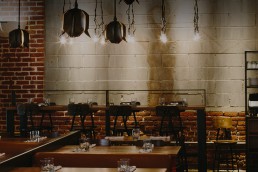All restaurant owners have a specific image in mind for their establishment. It often involves a strong sense of brand loyalty among many patrons who return time and again and contribute to consistent revenue. Unfortunately, few restaurants get the opportunity to reach this successful goal and shut their doors before they have a chance to prove their worth.
This could be attributed to several reasons, but perhaps a better way to find out what restaurants can do to avoid failure is by looking at the qualities shared by successful restaurants. Restaurant efficiency is a key driver of restaurant success. Below are the top 10 qualities of a highly efficient restaurant.
- Location and parking
The real estate industry isn’t the only one that benefits from emphasising the importance of “location, location, location.” A restaurant must be easily accessible and offer sufficient parking so that customers will not find it difficult to frequent.
- Simple (but appealing) menu
Having an extensive menu prevents the kitchen from being able to specialise and increases the number of time customers take to order. Restaurant efficiency relies on a simple menu with a limited number of items. - Atmospheric music
Musical tempo has an effect on breathing and heart rate. Playing fast-paced music in a restaurant will prompt patrons to spend less time at tables and servers to be more efficient. This also increases table turnover. - Fast checkout
Efficient restaurants always use some form of technology to help streamline payments and speed up the checkout process. A PoS system forms a good basis and other payment methods like mobile payments can also be integrated in the process. - FOH and BOH communication
If your front- and back-of-house communication channels are clear and easy, you optimise efficiency by reducing the need for servers to run back and forth. Using a PoS that sends orders to BOH automatically allows for notes on specific orders and has kitchen displays that will ensure BOH always knows what’s required. - Regular training
The knowledge and experience of your staff create restaurant efficiency. For this reason, efficient restaurants conduct regular training to ensure staff always remain empowered to do their jobs. Best practice is to offer incentives to drive motivation.
- Optimised layout
- Restaurant revenue relates directly to the number of patrons who are served in a day. Efficient restaurants have a seating layout that can accommodate many guests but can still remain tasteful. Keep in mind that there should be sufficient space in between tables for servers to move around freely.
Related Posts
28th February 2018
The power of mobile PoS sits in the palm of your hand
Keeping up with technological…
28th February 2018
How to stop fraud and theft from eating into the restaurant industry
Operating a business in the restaurant…
28th February 2018
Winter is here: Restaurant ideas to cash in on GoT
Winter is coming. These have always…
28th February 2018
The latest in restaurant digital news: are you ready for the next generation customer?
The arrival of millennials into the…






